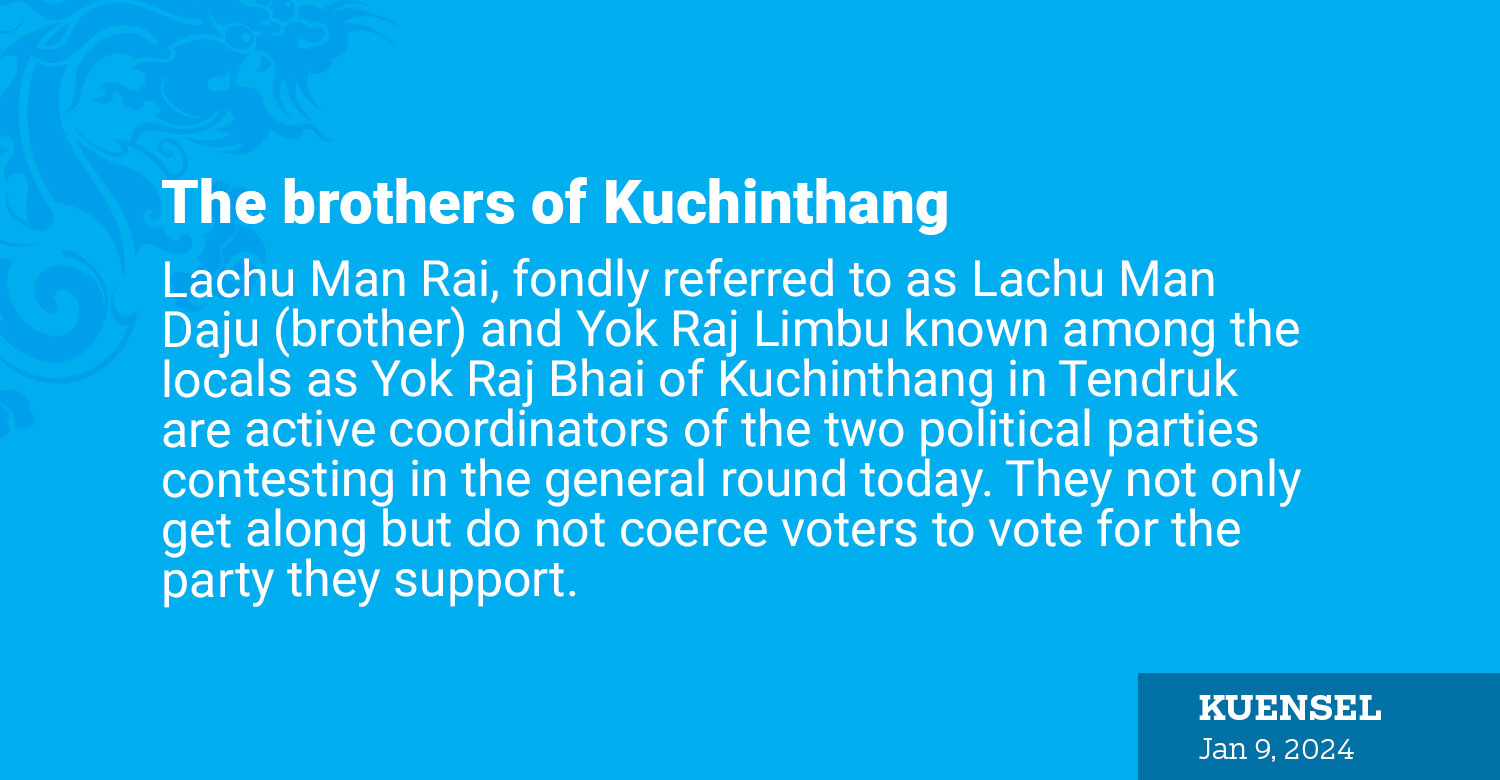Parties come and go, brotherhood remains, say the party coordinators
YK Poudel
Lachu Man Rai, fondly referred to as Lachu Man Daju (brother) and Yok Raj Limbu known among the locals as Yok Raj Bhai of Kuchinthang in Tendruk are active coordinators of the two political parties contesting in the general round today. They not only get along but do not coerce voters to vote for the party they support.
Lachu Man, 63, and Yok Raj, 41, are two popular and influential farmers in Kuchinthang. They have known each other for years. Yok Raj respects Lachu Man for his sincerity, dedication and wisdom. They are next-door neighbours. Lachu Man Rai is the local coordinator for Bhutan Tendrel Party (BTP) and Yok Raj Limbu is the coordinator for People’s Democratic Party (PDP) in Tendruk gewog.
Despite the party they support, the “brothers,” as they are known since the 2023-24 Assembly elections were announced, work together despite all the differences. For the duo, winning or losing or which party becomes the government doesn’t matter. They want a government that will benefit the people of their constituency.
Their message is clear—choose the party that convinces you and not that you blindly support or are told to support. This is evident from the local meetings they coordinate when parties or candidates are in town. Recently when the BTP visited Tendruk, Lachu Man Rai coordinated the overall proceedings of the meeting. Yok Raj and his supporters attended the meeting to listen to the party. When it was PDP’s turn, Yok Raj Limbu invited Lachu Man and his supporters. The duo also encouraged the people to attend all meetings when candidates of the two parties visited Kuchinthang.
On the eve of the poll day, yesterday, their message came out loud and clear: “We have heard it enough from the party candidates. Democracy is a gift from the monarch, let us not waste our vote,” Yok Raj Limbu said. “There are similarities and differences in what the parties said, people should think and choose a party that is good for themselves and the nation,” said Lachu Man Rai.
Samtse is one of the poorest dzongkhags in the country. People feel that there are untapped resources and areas that the government must focus in the region to develop the dzongkhag.
Lachu Man Daju feels that improving the mode of transportation like cable wire service promised by BTP at Tendruk will support various projects. He said that the local community will be able to reap benefits from the high-yielding Miyazaki mangoes in Kuchinthang and nearby chiwogs. “The agricultural products can be stored in the cold storage facility which the BTP has pledged in Tendruk.”
Meanwhile, Yok Raj Bhai says that PDP will ensure quality education with more central schools to come with PDP’s win. “Life Insurance scheme is another attraction for the general public. The citizens will benefit with Ngultrum 150,000 as insurance—this will help a family to invest into productive returns.”
“The 10-bedded hospital with trained medical personnel will benefit the local communities. Similarly, youth engagement programmes are another attraction,” he said.
Samtse is dzongkhag with porous borders and both the supporters feel the inflow of drugs is a problem. While Lachu Man shared the causes, Yok Raj has the solutions.
Lachu Man said that youth unemployment is one of the many causes why youth are resorting to drugs. “The easy money is enticing those from the low-income group to get into the drug business,” he said.
Yok Raj believes cutting the supply from the source is the solution. “Ensuring strict monitoring at the gates, youth engagement policy and supporting youth entrepreneurship and job creation could provide solutions to the problem.”
The dzongkhag, according to Yok Raj, is coming up with a major transformation in the recent days, with Gyalsuung and the hydropower projects. These projects will pull in more human capital and improve their productivity.
Lachu Man Rai and Yok Raj Limbu who had lived as close neighbours say that any party after coming to power has to serve the general public: “The government must be flexible in integrating the manifestos of both the parties and work as the government of the people and for the people.”


